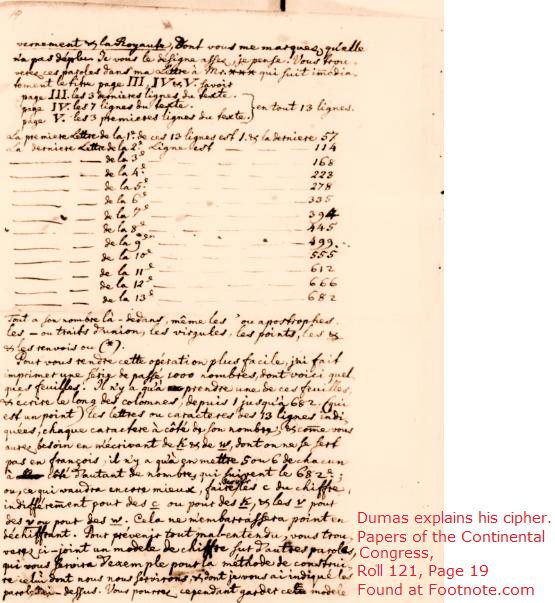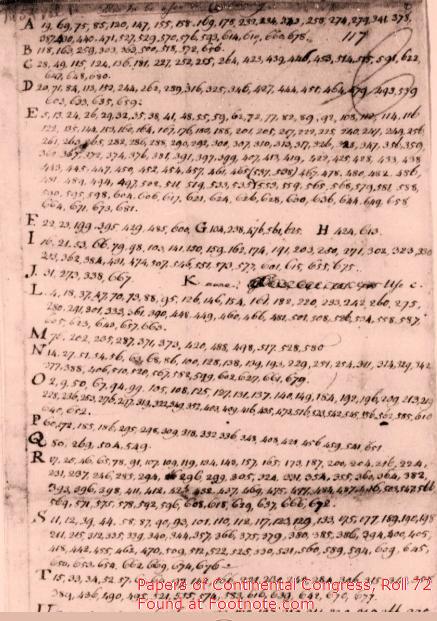The Founding Fathers1 — the founders of the United States of America — used various forms of cipher in their correspondence. Benjamin Franklin2, for example, occasionally used a cipher that was developed by Charles Guillaumes Frédéric Dumas3, who stayed in the Netherlands during the American Revolution. Because he was a fervent supporter of the American cause, Dumas was asked to spy for the United States, in 1781, Bejamin Franklin wrote a letter from Passy (France) to Dumas, stating the following:
I have just received a 14, 5, 3, 10, 28, 2, 76, 203, 66, 11, 12, 273, 50, 14, joining 76, 5, 42, 45, 16, 15, 424, 235, 19, 20, 69, 580, 11, 150, 27, 56, 35, 104, 652, 20, 675, 85, 79, 50, 63, 44, 22, 219, 17, 60, 29, 147, 136, 41, but this is not likely to afford 202, 55, 580, 10, 227, 613, 176, 373, 309, 4, 108, 40, 19, 97, 309, 17, 35, 90, 201, 100, 677.
For a long time, nobody was able to decipher the text, because even the State Department in Washington didn't possess a key for the cipher. Later, the following French fragment appeared to be the key to decipher:
Voulez=vous sentir la difference? Jettez les yeux sur le continent septentrional de l'amerique. Dans les resolutions vigoureuses de ces braves colons vous reconnoitrez la voix de la vraie liberte * aux prises avec l'oppression. Vous fremirez, vous vous revolte= rez contre la morgue & la durete inconcevable de ceux, qui, jaloux a l'extreme de leur propre liberte, pensent de pouvoir devenir plus puissants, de pouvoir rester libres eux=memes en asservissant leurs freres. Vous ne pourrez vous empecher de faire votre cause de celle de ces peuples, de leur savoir gre de leur fermete, de trem= bler qu'ils ne suciombent sous la massue levee du pouvoir, qui veut ou les gouverner arbitrairement, ou les ecraser, en fin de leur sou= haiter avec le genereux d. der. tout le succes possible dans leur juste resistance.
This passage is copied from the prologue that Dumas had written in a book he had sent to Franklin: Le droit des gens (International law) of Emerich de Vattel. Dumas had had this work reprinted with his own prologue and some notes in which the views were applied to the situation in America. In 1775, he sent three copies to Benjamin Franklin.
Assignment
For the Charles Dumas cipher a text fragment is coded as a list of numbers. In order to code and decode, a second text fragment — the key text — is used that must be kept a secret at all times. To decode a number $$n$$, one must simply search the character on the $$n$$th position in the key text. On determining the positions in the key text, white space (spaces, tabs and line endings) are ignored and the first character is on the first position. For the key text "Lost time is never found again." the positions of the characters are for example
| positions | 1 | 2 | 3 | 4 | 5 | 6 | 7 | 8 | 9 | 10 | 11 | 12 | 13 | 14 | 15 | 16 | 17 | 18 | 19 | 20 | 21 | 22 | 23 | 24 | 25 | 26 | |||||
|---|---|---|---|---|---|---|---|---|---|---|---|---|---|---|---|---|---|---|---|---|---|---|---|---|---|---|---|---|---|---|---|
| characters | L | o | s | t | t | i | m | e | i | s | n | e | v | e | r | f | o | u | n | d | a | g | a | i | n | . |
In this case, numbers 11, 19 and 25 all represent the letter n. To code the letter n, one can randomly choose between the numbers 11, 19 and 25. For this assignment, however, we will use a more strict coding scheme. If we have to code a text fragment that contains the letter n multiple times, we will first replace this letter by the number 11, the second time by 19 and the third time by 25. Because the n only occurs on three positions in the key text, we will code the fourth letter n as the number 11, and so on. If we follow this procedure with the example key text above, the word nondeterminativeness will be coded as
| karakters | n | o | n | d | e | t | e | r | m | i | n | a | t | i | v | e | n | e | s | s |
|---|---|---|---|---|---|---|---|---|---|---|---|---|---|---|---|---|---|---|---|---|
| posities | 11 | 2 | 19 | 20 | 8 | 4 | 12 | 15 | 7 | 6 | 25 | 21 | 5 | 9 | 13 | 14 | 11 | 8 | 3 | 10 |
On coding the message, characters of the message that don't occur in the key text, may be ignored.
Write a function cipherkey to which a string must be given that contains the key text. The function must print a dictionary, that portrays every character that occurs in the key text on the list of positions in the key text on which this character occurs. the positions must be listed in increasing order. White space ins the key text must be neglected. The positions of the characters are numbered from 1. The function also may not distinguish between uppercase and lowercase letters, and the uppercase variant of a letter must be used as a key in the dictionary.
Use the function cipherkey to write a function encode to which two strings must be given: a text fragment that needs to be coded and the key text that must be used to code. The function must code the given text fragment according to the strict code scheme that was mentioned above.
Example
>>> keytext = 'Lost time is never found again.'
>>> key = cipherkey(keytext)
>>> key['N']
[11, 19, 25]
>>> key['E']
[8, 12, 14]
>>> key['.']
[26]
>>> encode('nondeterminativeness', keytext)
[11, 2, 19, 20, 8, 4, 12, 15, 7, 6, 25, 21, 5, 9, 13, 14, 11, 8, 3, 10]
>>> encode('interdenominationalism', keytext)
[6, 11, 4, 8, 15, 20, 12, 19, 2, 7, 9, 25, 21, 5, 24, 17, 11, 23, 1, 6, 3, 7]
>>> encode('gastroenteroanastomosis', keytext)
[22, 21, 3, 4, 15, 2, 8, 11, 5, 12, 15, 17, 23, 19, 21, 10, 4, 2, 7, 17, 3, 6, 10]Final number
On 30 April 1776 Alexander Dumas wrote a letter to Benjamin Franklin (head of the Committee of Secret Correspondence) in Philadelphia. In his letter he elaborately expressed his gratitude for what he meant to the country, and he also gave a detailed explanation for the cipher he had developed. Becaus K and W aren't used in French, the didn't occur in the key text. For this reason he advises, among other things, using two us instead of a w and a c instead of a k.


With this knowledge, the message in the introduction states:
I have just received a neuu comiissjon joining me uuith m adams in negodiaions for peace but this is not likely to afford me much employ at present.